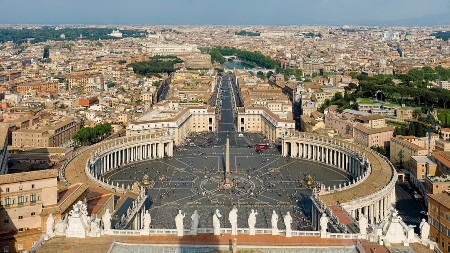 Dear readers, Catholic Online was de-platformed by Shopify for our pro-life beliefs. They shut down our Catholic Online, Catholic Online School, Prayer Candles, and Catholic Online Learning Resources—essential faith tools serving over 1.4 million students and millions of families worldwide. Our founders, now in their 70's, just gave their entire life savings to protect this mission. But fewer than 2% of readers donate. If everyone gave just $5, the cost of a coffee, we could rebuild stronger and keep Catholic education free for all. Stand with us in faith. Thank you. Help Now >
Dear readers, Catholic Online was de-platformed by Shopify for our pro-life beliefs. They shut down our Catholic Online, Catholic Online School, Prayer Candles, and Catholic Online Learning Resources—essential faith tools serving over 1.4 million students and millions of families worldwide. Our founders, now in their 70's, just gave their entire life savings to protect this mission. But fewer than 2% of readers donate. If everyone gave just $5, the cost of a coffee, we could rebuild stronger and keep Catholic education free for all. Stand with us in faith. Thank you. Help Now >
Gordon Brown's remarks: English lessons
FREE Catholic Classes
Many maintain that great crises are also - or perhaps above all - moral crises. The current economic-financial crisis is no exception to this rule.
Highlights
Chiesa (chiesa.espresso.repubblica.it)
3/3/2009 (1 decade ago)
Published in Europe
ROMA (Chiesa) - Sandro Magister presented the following article from L'Observatoro Romano in Chiesa:
Gordon Brown's remarks on the economic crisis. English lessons
Many maintain that great crises are also - or perhaps above all - moral crises. The current economic-financial crisis is no exception to this rule, since it was provoked by selfish and unsustainable development decisions, which then unleashed the worst "animal spirits" in the world of finance.
In "L'Osservatore Romano" last February 19, British prime minister Gordon Brown seemed to be expressing the search for a moral authority necessary for the solution of crisis, implicitly recognizing the unsustainability of the economy's moral autonomy. He also advanced the proposal for structural solidarity with poor countries as a possible strategic solution to the crisis. In addition to calling for acts of "justice and solidarity," it is in fact necessary to propose acts of "opportune solidarity" on behalf of poor countries.
These countries must be involved in the process for solving the crisis, by encouraging them to create the wealth necessary to revive the entire world. This could be done by transforming their unexpressed demand for goods and investments into value for the economies in countries that today find their production capacity dangerously underused. The strategy for solving the crisis lies in creating wealth to compensate for the losses, where there is potential to do this rapidly.
Apparently, the extremely expensive measures now been taken tend instead to support consumption in rich countries, and to transfer to the state the unsupportable debts of banks, companies, and families. But this solution risks creating inflation instead of wealth. Having transferred wealth and prosperity to various emerging countries in recent years may have made the crisis now underway less severe. Forecasts for gross domestic product in 2009 see a drop of 3.4 percent in the United States, and 1.5% in Europe.
But global GDP is still growing by 1%, thanks to the economies of large nations like China (more than 5 percent), India, and Brazil. Even though it was done for selfish reasons, the extension of prosperity to these countries - developing demand, supply, saving, and growth - now makes it possible to imagine remedies for the errors of rich countries. It might have been possible to avoid the global crisis if the extension of wealth had also involved the rest of the planet. Instead of thinking selfishly about defending privileges, and moreover by cheating.
But the errors of the Western world are not due solely to the excessive carelessness of bank managers and the lack of control. Economics and finance are only tools handled by man, which should be helpful to man. Following the laws that regulate them, their aim is to utilize resources effectively, develop prosperity for all, and reduce inequality. This is not morality, it is economics.
But the balance sheet is not always comforting. Often there has been abuse of resources, the development of prosperity has been fraudulent, and inequalities have not been reduced as they could and should have been. The tools have not been given a meaning. The rich world has been stupid - and not only selfish - in refusing to recognize the necessity of moral authority and laws, thus confusing the means with the ends.
In his remarks, Gordon Brown, the prime minister of a great nation, has given a masterful lesson for all who are willing to listen to it: meaning must be given to the tool of economics, and it must be recognized that the economy cannot have its own moral autonomy.
---
Chiesa is a wonderful source on all things Catholic in Europe. It is skillfully edited by Sandro Magister. SANDRO MAGISTER was born on the feast of the Guardian Angels in 1943, in the town of Busto Arsizio in the archdiocese of Milan. The following day he was baptized into the Catholic Church. His wife�s name is Anna, and he has two daughters, Sara and Marta. He lives in Rome.
Join the Movement
When you sign up below, you don't just join an email list - you're joining an entire movement for Free world class Catholic education.

-

-
Mysteries of the Rosary
-
St. Faustina Kowalska
-
Litany of the Blessed Virgin Mary
-
Saint of the Day for Wednesday, Oct 4th, 2023
-
Popular Saints
-
St. Francis of Assisi
-
Bible
-
Female / Women Saints
-
7 Morning Prayers you need to get your day started with God
-
Litany of the Blessed Virgin Mary
Daily Catholic
 Daily Readings for Thursday, January 16, 2025
Daily Readings for Thursday, January 16, 2025 St. Fursey: Saint of the Day for Thursday, January 16, 2025
St. Fursey: Saint of the Day for Thursday, January 16, 2025 Prayer for a Blessing on the New Year: Prayer of the Day for Tuesday, December 31, 2024
Prayer for a Blessing on the New Year: Prayer of the Day for Tuesday, December 31, 2024- Daily Readings for Wednesday, January 15, 2025
- St. Paul the Hermit: Saint of the Day for Wednesday, January 15, 2025
- St. Theresa of the Child Jesus: Prayer of the Day for Monday, December 30, 2024
![]()
Copyright 2024 Catholic Online. All materials contained on this site, whether written, audible or visual are the exclusive property of Catholic Online and are protected under U.S. and International copyright laws, © Copyright 2024 Catholic Online. Any unauthorized use, without prior written consent of Catholic Online is strictly forbidden and prohibited.
Catholic Online is a Project of Your Catholic Voice Foundation, a Not-for-Profit Corporation. Your Catholic Voice Foundation has been granted a recognition of tax exemption under Section 501(c)(3) of the Internal Revenue Code. Federal Tax Identification Number: 81-0596847. Your gift is tax-deductible as allowed by law.






 Daily Readings for Thursday, January 16, 2025
Daily Readings for Thursday, January 16, 2025 St. Fursey: Saint of the Day for Thursday, January 16, 2025
St. Fursey: Saint of the Day for Thursday, January 16, 2025 Prayer for a Blessing on the New Year: Prayer of the Day for Tuesday, December 31, 2024
Prayer for a Blessing on the New Year: Prayer of the Day for Tuesday, December 31, 2024

